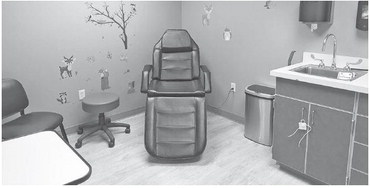Medford students will have to bag their phones next year
Medford Area Middle and High School students will be phone free come fall whether they like it or not.
At Monday’s school board meeting, board members approved moving forward with developing policies to implement a student cellphone ban in the buildings.
Students will be required to place their phones, smart watches and earbud devices into special protective bags which will be magnetically locked when students enter the buildings in the morning and unlocked on their way out at the end of the day.
The school district received a $40,000 grant from the Aspirus Community Benefit program to purchase bags and unlocking stations from Yondr, a Los Angeles, Calif, based business that has been selling the bags since 2014. Lybert said this initial purchase would cover all the students in the two schools and they are looking at grant opportunities in the future to cover students entering the middle school.
While students would be issued their first Yondr pouch, if it is damaged or lost it will be the student’s responsibility to replace it, much like a textbook.
Medford is looking to be ahead of a national trend to get student cellphones out of school buildings. Last May, Florida Gov. Ron DeSantis signed a law to ban students in that state from using cellphones in schools and on June 18, the Los Angeles School board approved a ban for the city’s schools. In addition, cellphone statewide bans and restrictions are currently being considered by legislatures in Oklahoma, Washington, Kansas, Vermont, Connecticut, Virginia, Minnesota and South Carolina.
Lybert and a committee of administrators and teachers have been working on the recommendation for several weeks.
They cited the following reasons for why they feel a cellphone ban is needed:
★ Decreased Academic Performance: Cell phones are incredibly distracting and limit a student’s ability to concentrate in class. They noted the number of students with Ds and Fs in classes has risen since cellphone use among students exploded around
2012.
★ Increased Behavioral Issues: Negative student behavior is exacerbated by phones and social media. Cell phone use during the
★ ★
school day elicits bullying, planned vaping in bathrooms, and escalated situations contribute to an increase in negative behaviors. Assistant principal Andy Guden, reported there were 133 violations of the existing cellphone rules last year in the high school alone, ranging from attempts to spread pornographic content in a classroom sideshow to students running platforms where anonymous comments are posted about other students and staff, as tools in bullying and students recording or taking pictures of other students using the bathrooms, among many other offenses. Impact of Cyberbullying: Both students and teachers report many issues of inappropriate cell phone use at school, which impacts their safety and mental health. Lack of Social Connection: Students are so engaged in their phones that they forget to engage with each other, limiting their opportunities to socialize with their peers and impacting their ability to learn important social skills.
Guden said the current regulations are not working and stronger steps are needed. He gave the example how under the current rules students misusing cellphones in class have their phones kept in “phone jail” in the office for five days. He said he had students choosing to have out of school suspensions rather than having their phone be kept at the office.
The school conducted a survey of parents with students in the middle and high school buildings. Of the 360 responses received, 58.3% were in support of cellphones being removed from the school day.
However, it was also noted that there was a significant concern among many parents regarding safety and communication with their student.
Lybert addressed these concerns noting that students have always been reachable through the main office and by email through the school issued Chromebooks. Even with the pouches, the students will be able to come to the office to access their device and contact their parent in an emergency. In emergency situations the devices to unlock the Yondr pouches will be at the designated safety locations. It was also noted that in these types of situations the pouches would be able to be cut open for students to access their devices.
In addition, coaches and teachers will have the ability to check out the unlocking stations for in-class activities such as utilizing quiz learning games such as Kahoot or when leaving the school for an event.
Lybert also noted that students with special needs such as using the phone apps to monitor blood sugar would be granted exception to have access to devices. She said they will also be understanding and compassionate about student and family situations.
On a roll call vote, board members voted unanimously in support of moving ahead with the Yondr pouches and with the creation of policies and procedures to implement student cellphone use bans in the middle and high school.
It was noted that there has already been a ban in place at the elementary school, and while it has not been a problem there, the district is monitoring concerns and could see the use of the Yondr pouches expand in the future if needed.
The action brought with it opposition, with a student speaking during public comment opposing the ban citing concerns about not being able to get ahold of her parents after school. A parent also spoke against it suggesting it would drive more students away from the brick and mortar school building into the Rural Virtual Academy. Board president Dave Fleegel noted the academic rigor of the RVA and that in the past students thinking that it would be easier were mistaken and quickly came back to the brick and mortar building.
Lybert told board members that the move isn’t being done to make life easier for staff or administrators, but to be in the best interest of students. She said they have been warned by administration at Clintonville and other schools that have implemented these types of bans that students will be going through withdrawal from phone addictions and that there will be an increase in cellphone use incidents and violations in the first few months of the school year before things improve.




